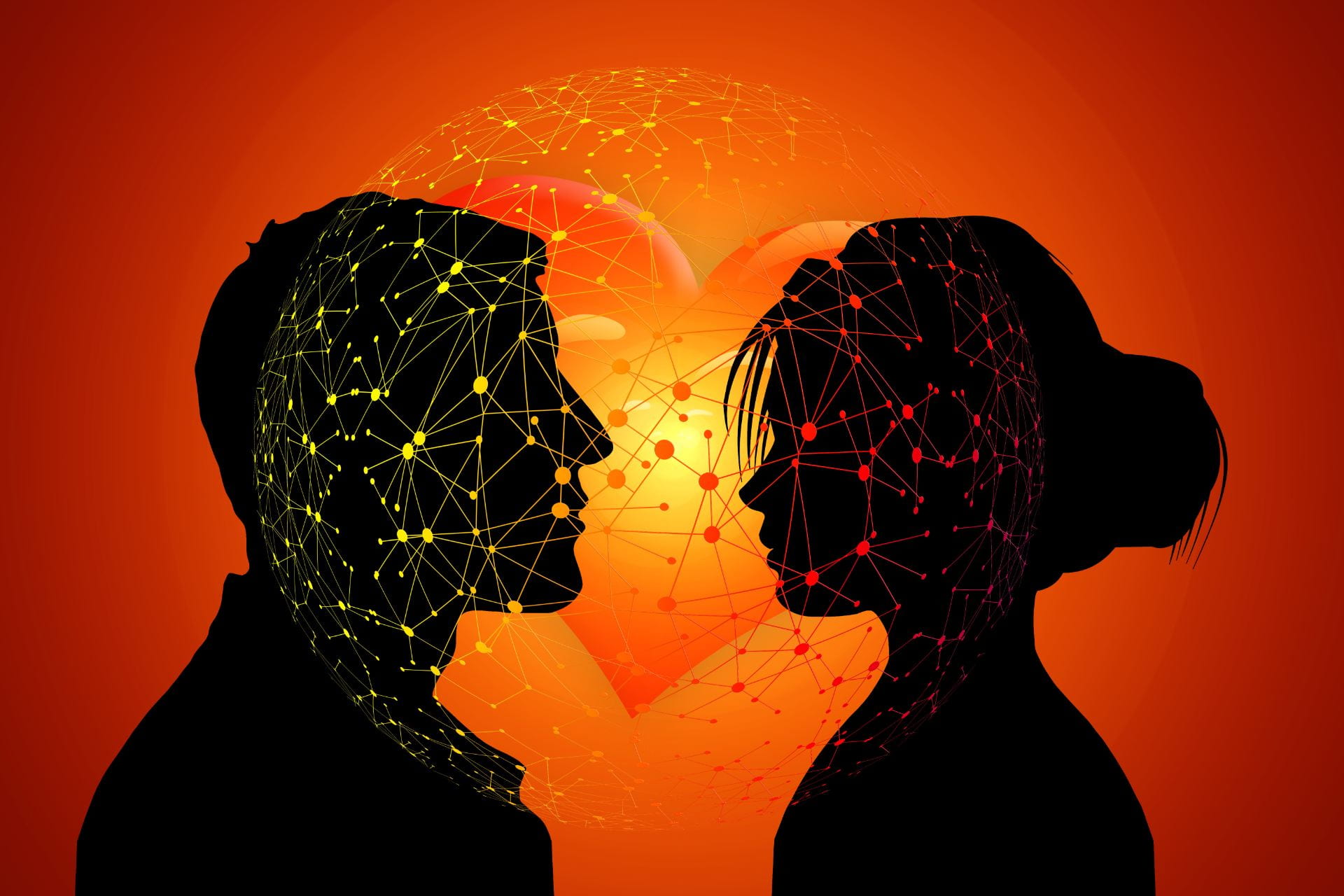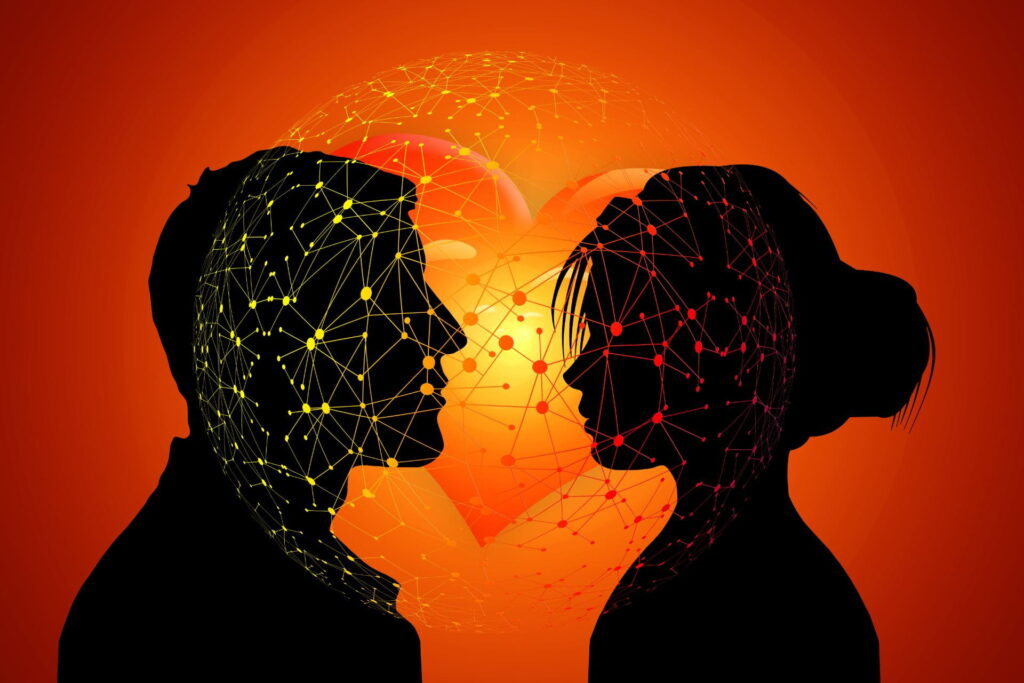Your cart is currently empty!

Why Do I Date Similar People?
Why do I date similar people, every single time? Have you ever noticed that you left one relationship, and promised yourself you would never get involved with someone like that, and BAM, you did it again? Have you found that your partner has similar qualities to your family members? How about meeting your lover’s family and being so grateful that they are nothing like their family? Then after years realize that they are much more like their family than you thought. Or how about you, who states, I will never be like my mother or my father, and suddenly you are just like them?

Psychologists have extensively studied the phenomenon of repeating patterns in relationships, and they often attribute these patterns to various psychological and emotional factors. Yet there are also energetic patterns that you can carry within the patterns of your own auric energy field. These patterns can repeat themselves through many generations of ancestors, or from patterns developed in past lives. I will cover both angles in my blog post titled, “Why do I date the same type of person, every single time? Click here to learn more about the psychological patterns of relationships.
When you look at your own life from a purely spiritual perspective, what is illuminated are the lessons that you gain insight and wisdom from. Some learning can come into your life like a big harsh stick and others are joy-filled light. Ultimately, those who find themselves looking through the lens of everything is a lesson, and then working through relationship issues can have an exploration of curiosity rather than frustration. Don’t get me wrong, I can remember everything is a lesson and be gritting my teeth in annoyance at the same time. When those stubborn lessons seem to hang on forever, you might find yourself saying, “Come on already, isn’t this done yet?”.
Recently, I found myself seeing this one energetic pattern in several people around me. This pattern was filled with over-analysis, and prickly energy, with an edge of stubbornness to it. I felt challenged to be in their company. After 30 years of spiritual experience using meditation tools to work through my relationship lessons, I have found that I have real staying power. Meaning, that I have enormous patience to work through the layers of learning, excited to see what lesson will be revealed at the end. This pattern had been showing itself for over a year and I had grown to find it normal. Then one afternoon, I scheduled a Healing Touch Treatment, to clear, balance, and harmonize my energy field. To my surprise (I shouldn’t have been) that pattern that I saw in others completely dissolved when I let it go from my own energy field. Meaning, behaviors that I had applied to them, suddenly no longer existed. It was a great reminder to me as a spiritual teacher that those around me are my mirrors to show me what I need to work on in myself.
Some Common scenarios where people tend to repeat relationship patterns include:
Attraction to the Same Personality Traits: Individuals may find themselves repeatedly attracted to partners with similar personality traits, such as being overly controlling, passive-aggressive, or emotionally distant.
Choosing Unavailable Partners: Some people have a pattern of entering relationships with individuals who are emotionally unavailable, leading to a cycle of unfulfilling connections.
Seeking Validation: People who seek validation and approval may repeatedly choose partners who are critical or dismissive, mirroring their past experiences.
Repeating Parental Dynamics: Individuals may recreate the same dynamics they observed between their parents during childhood, even if those dynamics were unhealthy.
Avoiding Intimacy: Some people have a fear of intimacy and repeatedly choose partners who are unable or unwilling to establish deep emotional connections.
Codependency: Individuals with codependent tendencies may repeatedly enter relationships with partners who have addiction issues or emotional instability.
Suffering from Abuse: Unfortunately, some individuals who have experienced abuse may be drawn to abusive partners, perpetuating a cycle of abuse.
Difficulty Setting Boundaries: People who struggle with setting and maintaining healthy boundaries may attract partners who take advantage of this weakness.
Insecurity and Jealousy: Those who battle insecurity or jealousy may repeatedly date partners who trigger these emotions, often due to their own behaviors or past experiences.
Pattern of Affairs: Some individuals have a pattern of engaging in extramarital affairs, either as the cheater or the person involved with a cheater.
These scenarios often have roots in past experiences, upbringing, or unresolved emotional issues. Recognizing these patterns is the first step towards breaking free from them and building healthier relationships. It’s essential to address the underlying causes through self-reflection, therapy, or counseling to achieve personal growth and change.
Psychological theories provide insights into why individuals tend to repeat relationship patterns. Here are some of the key psychological theories and concepts that help explain this phenomenon:
Attachment Theory:
Attachment theory, developed by John Bowlby and Mary Ainsworth, suggests that early attachment experiences with caregivers profoundly influence adult relationships. People who had secure attachments as children tend to have healthier relationships as adults. In contrast, those with insecure attachments may seek out partners who replicate the same attachment dynamics they experienced in childhood. For example, someone with an anxious attachment style may repeatedly date partners who are emotionally distant.
Familiarity and Comfort:
Humans tend to gravitate towards what feels familiar and comfortable, even if it’s not necessarily healthy. People may choose partners who remind them of family members or previous partners because the known, even if it’s problematic, can feel safer than the unknown.
Cognitive Schema Theory:
Cognitive schemas are mental frameworks that shape how individuals interpret and respond to experiences. Relationship schemas are developed through past experiences and can lead people to expect and perceive certain behaviors in their partners. These schemas can become self-fulfilling prophecies, causing individuals to unconsciously select partners who conform to their expectations.
Unresolved Issues:
Individuals often carry unresolved emotional baggage from past relationships. They may subconsciously seek out partners who allow them to work through these unresolved issues. For example, someone who experienced abandonment in a previous relationship may be drawn to partners who trigger feelings of abandonment.
Role of Projection:
Projection is a psychological defense mechanism where individuals attribute their own thoughts, feelings, and traits to others. In relationships, people may project their own unresolved issues onto their partners. This can lead them to perceive the same issues in their partners, even if the partners do not possess those traits. These projections can be shocking when you are blamed for always being late, leaving cabinet doors open, and always losing your keys, when the person projecting is the one that has those issues.
Repetition Compulsion:
Freud introduced the concept of “repetition compulsion,” where individuals unconsciously reenact past traumas or conflicts in an attempt to master them. This can manifest in relationships, where people may recreate the same emotional dynamics from past relationships, hoping for a different outcome. Often in spiritual lessons, you will find this to be true. Choosing an individual who behaves in similar ways so you can work through your own issues around it.
Self-Esteem and Self-Worth:
Individuals with low self-esteem or a negative self-concept may be drawn to partners who validate their negative self-beliefs. They may repeatedly choose partners who mistreat them or undermine their self-worth. When you carry the energetics of low self-esteem, often, those around you will pick up on the energetic patterns and do things to further trigger those patterns.
Cultural and Societal Influences:
Cultural and societal norms and expectations can also play a role. For instance, individuals from certain cultural backgrounds may feel pressure to marry within their community, leading to repeated patterns of choosing partners from similar backgrounds. Recently, I attended a conference, where I met many individuals with a culture of hunting and wild game. Personally, this is not a culture that I would find myself a part of, but I could clearly see similar cultural patterns that hunters shared in their communication styles. (I thoroughly enjoyed learning how hunters are so connected with nature).
Family dynamics can play a significant role in repeating relationship patterns. The experiences and observations individuals have within their families of origin can shape their beliefs, expectations, and behaviors in future romantic relationships. Here’s how family dynamics influence relationship patterns:
Modeling Behavior:
Children often model their parents’ behaviors and relationship dynamics. If they grow up witnessing unhealthy patterns of communication, conflict resolution, or emotional expression, they may unknowingly replicate these behaviors in their own relationships. For example, a person who observed their parents avoiding conflict may struggle to address issues openly in their own relationships.
Interpersonal Skills:
The quality of communication and interpersonal skills learned within the family can impact how individuals navigate their relationships as adults. Those who grew up in families where open and effective communication was encouraged are more likely to have healthy communication patterns in their own relationships.
Role Expectations:
Family dynamics often involve specific roles and expectations for family members. These roles can be related to gender, age, or birth order. People may unconsciously carry these role expectations into their romantic relationships, which can influence how they relate to their partners. For example, someone raised in a family where they were the responsible eldest sibling may continue to take on a caregiving role in their romantic relationships.
Conflict Resolution:
How families handle conflict and disagreements can shape an individual’s conflict resolution skills and approach in their relationships. If someone grew up in a family that avoided conflict at all costs, they might find it challenging to address and resolve conflicts in their adult relationships.
Values and Beliefs:
Families often impart certain values, beliefs, and cultural norms to their members. These can include beliefs about love, commitment, gender roles, and more. These values can strongly influence the expectations and behaviors individuals bring into their romantic relationships.
Emotional Patterns:
Emotional patterns within the family, such as emotional expression, emotional availability, or emotional repression, can impact how individuals process and express their emotions in romantic relationships.
Breaking free from repeating family dynamics in relationships often requires self-awareness and conscious effort. Therapy or counseling can be a valuable resource for exploring the influence of family dynamics, understanding their impact on current relationships, and developing strategies for healthier patterns of relating. As well as meditation, journaling, and inner self-processing to bring consciousness to those patterns.
Examining repeating relationship patterns from an energetic point of view can provide a unique perspective on why individuals seem to attract similar energies or experiences. This concept delves into the idea that personal energy and vibrational frequencies play a crucial role in shaping the dynamics of our relationships.
Introduction to Energetic Perspective:
Imagine that each person emits a vibrational frequency, much like a unique energetic signature. This frequency is influenced by our emotions, thoughts, beliefs, and past experiences. According to this perspective, energies tend to attract one another. It’s akin to the law of attraction, where similar energies are drawn together.
Your auric energy field can present like a lock and key. Your energy patterns hold a certain shape and within that shape, another person’s energy patterns must match perfectly to fit into your pattern. Just like a key, can only fit into a lock to open it, a relationship key must match perfectly to fit into the lock pattern of your energy field. Energetically and spiritually you must change the lock pattern, to attract another type of person with a different key pattern otherwise, you continue to magnetically draw that same lock and key pattern. We teach this spiritual energy dismantling abilities through our courses, but it is you ultimately who must use those tools (and be willing) to change those patterns. It can be diligent determined work, but oh so fun, when you are witness to the healthier relationships that begin to gather around you.
Emotions are powerful energy drivers. When you consistently emit a particular emotion—whether it’s happiness, fear, anger, or love—it sends out a corresponding vibrational frequency. Others who resonate with that emotion may be drawn to you, leading to patterns of attracting individuals who share similar emotional states. Not comparing humans to dogs but recently I learned a powerful lesson about my 10th-month-old chocolate Labrador puppy that I have found to be similar in human relationships. In her (Sadie) first introduction to Doggy Daycare, there were about 12 other dogs in a field of grass. Sadie could be found hanging out with a poodle that was half her size. There were other dogs her size, other breeds, and other Labradors, but she only wanted to hang out with this smaller poodle. When I asked the Dog Care Owner about this, she said that dogs tend to know which dogs are the same age as them. This poodle was also 10 months old. Here is my blog post on 5 Energy tips to improve emotional intelligence.

I mention this because, in my 30 years of study of the human energy field and relationships, I have found that couples tend to match up based on their emotional age. The couple maybe 30 years old, but their emotional age could be stuck at the emotional age of 7, 12, or 2 years of age. You may feel that your partner behaves in a very immature way, but I invite you to examine your own emotional age to see if there are similarities. Is it an easy energetic fix? Absolutely! Just mind yourself how old you are when it comes to mind, and meditate on your second (emotional) chakra, to deepen your understanding of why it may be stuck at a certain age.
Beliefs and Thought Patterns: Your beliefs and thought patterns also emit energy. If you hold certain beliefs about yourself or your relationships, these beliefs can shape your energetic field. Consequently, you may attract partners who align with those beliefs, even if they are detrimental or limiting. Often, I will say to my own partner when we seem to disagree that the frequency of what matters most to us is similar, so nothing else really matters.
Unresolved Trauma and Past Experiences: Unresolved emotional wounds and past traumas can create energetic imbalances. People who have unresolved issues may unconsciously attract partners who mirror these issues, offering an opportunity for healing and resolution. Victims of abuse may attract similar patterns of abuse or may attract a protector to help them feel safe from further abusive situations.
Past Lives and Ancestral patterns can be carried over into your current life. As a clairvoyant reader who studies human energy patterns, some of my clients worked on one single relationship issue over many lifetimes. Often this is because the issue was far too big to complete in one life. An example might be learning to stand in your power, hold strong to boundaries, or spend a lifetime experiencing victim patterns until you learn what you came to learn. Ancestral relationship patterns may come through the fathers’ line, of men, learning to resolve a dominant style of being a man, to heal into a balanced state of relationships. Often, I will see ancestral generations of women being subservient to other generations (that served them well at the time), and with each generation, a woman is able to stand as an equal. Learn more about spiritual relationships.
Understanding the role of personal energy and vibrational frequencies allows individuals to become more aware of the energies they are projecting and attracting. By consciously shifting their energy—through practices like mindfulness, self-reflection, and energy healing—they can begin to break free from patterns of attracting similar energies that no longer serve them.
Conclusion:
In your quest for balanced and fulfilling relationships, exploring the energetic perspective can offer profound insights into why certain patterns persist. By taking proactive steps to raise one’s personal vibrational frequency and become more aware of their energetic emissions, individuals can pave the way for healthier and more harmonious connections with others. This shift can lead to transformative changes in how they relate to and attract partners in the future.
Comments
2 responses to “Why Do I Date Similar People?”
-
Yes indeed, it is all true… in my story as well. thanks for the update on the blue light with Pam… November is going to be amazing…
-
It is going to be amazing.
-
Leave a Reply